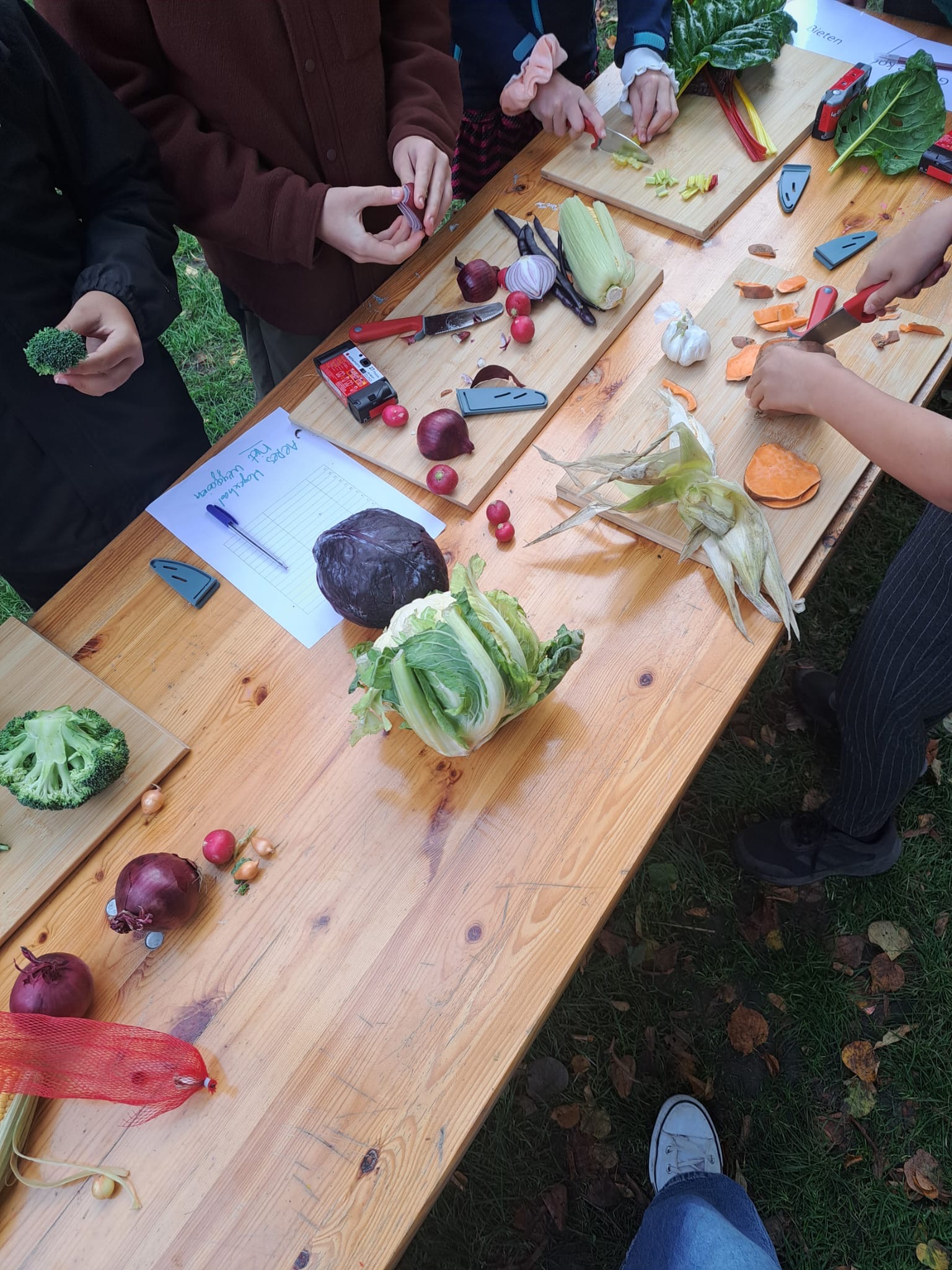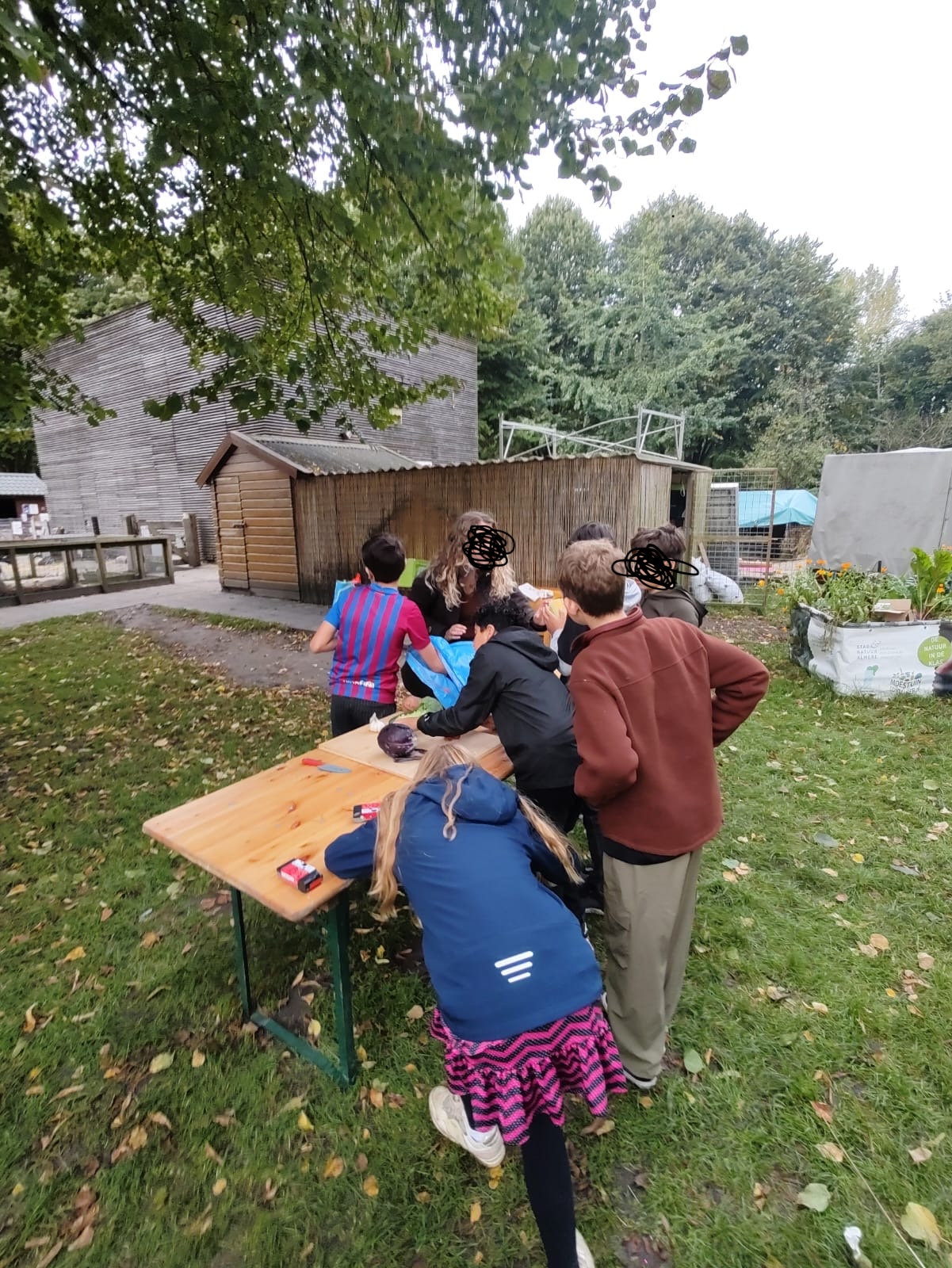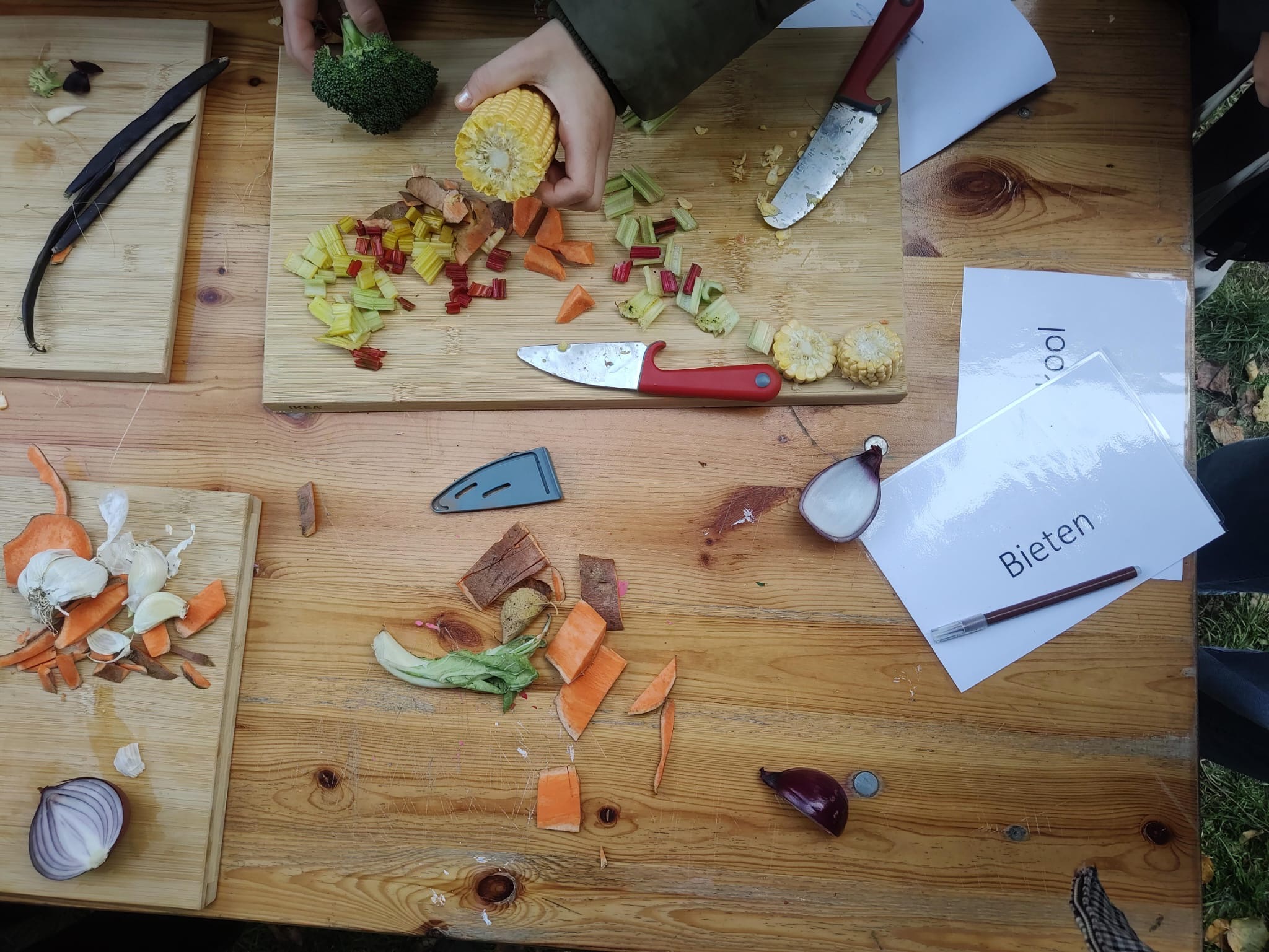Seed Project: Schools and Vegetable Education
Exploring Universality in Youths’ Experiences with Vegetables: School Gardens in the Netherlands and Benin
This project aims to initiate two participatory school vegetable garden-based learning programmes. One will be in two inner city schools in Amsterdam-Almere region with significant populations of youths with migrant backgrounds. The second will be executed in Cotonou, Benin, in two schools in low-income neighbourhoods. Schools provide spaces to introduce students to healthy eating, fresh food, and the (in)equitable economies of the larger community food system. Therefore, schools are critical for food education, and there is a long tradition of schools serving as sites of food production and consumption. Food education in schools can offer new viewpoints and add valuable skills and attitudes. By fostering a North-South collaboration, the project explores how school gardens can enrich young people’s well-being, food knowledge, and cultural exchanges across diverse socioeconomic and geographic contexts.
Key Goals
Youth Well-Being
The project looks at how vegetable gardening directly influences the physical, mental, and social well-being of schoolchildren. Connecting with nature through growing and nurturing plants fosters a sense of accomplishment, connection, and responsibility. For urban youths in Amsterdam-Almere region, especially those from migrant backgrounds, gardening offers a chance to reconnect with nature and learn about healthy, sustainable eating.
 In Cotonou, the focus shifts to addressing challenges like food insecurity and limited access to healthy meals. By engaging children in gardening, they can gain practical skills while also developing an appreciation for fresh, nutritious food. Beyond nutrition, the act of cultivating a garden has been linked to improved focus, teamwork, and a sense of ownership—key outcomes that this project aims to measure and support.
In Cotonou, the focus shifts to addressing challenges like food insecurity and limited access to healthy meals. By engaging children in gardening, they can gain practical skills while also developing an appreciation for fresh, nutritious food. Beyond nutrition, the act of cultivating a garden has been linked to improved focus, teamwork, and a sense of ownership—key outcomes that this project aims to measure and support.
Parental Engagement
Parents play a pivotal role in shaping food practices at home. This project intentionally includes them in the gardening programs to amplify the impact beyond the classroom. In the Amsterdam – Almere region, many parents, particularly from migrant communities, face barriers in accessing nutritional knowledge or affordable produce. Involving them in school gardening workshops and activities not only enhances their awareness but also provides practical solutions for improving household diets. 
In Cotonou, parental participation is equally vital. Many households rely on subsistence farming or informal markets, where access to diverse vegetables may be limited. By involving parents, the program helps introduce strategies for increasing vegetable consumption at home. This dual approach of targeting both schools and families ensures that the benefits of the gardening experience ripple outward, fostering community-wide improvements in food practices and health.
Why Amsterdam-Almere and Cotonou?
These cities offer a unique opportunity to compare experiences in high- and low-income contexts, leveraging their rich yet distinct histories of school gardens:
Amsterdam, Netherlands
With over 100 years of history, school vegetable gardens in the Netherlands have long reflected the country’s social and economic realities. Originally conceived as a response to economic hardship in the early 20th century, they provided food for poorer families. Over time, as prosperity grew, interest in these gardens declined, only to resurface in recent years due to rising concerns about sustainability and food security.
In the Amsterdam-Almere metropolitan region today, a growing number of families face hidden hunger—adequate calorie intake but insufficient access to nutritious foods like vegetables. Amongst the people who suffer from this hidden hunger, are low-income households, including migrant families, where language barriers and cultural differences further complicate access to healthy food. School gardens offer a solution, providing children—and by extension, their families—with the knowledge, skills, and resources to incorporate fresh vegetables into their diets. Despite this potential, only a small percentage of Dutch schools currently have gardens, highlighting the need for initiatives like this project to fill the gap.
Cotonou, Benin
Cotonou’s school garden history shares parallels with Amsterdam’s but has evolved in response to distinct sociopolitical factors. School gardens were part of broader educational reforms aimed at promoting agricultural skills. However, political and economic shifts over the decades eroded this practice.
Recent efforts, such as UNICEF-supported kitchen gardens, have begun to revive gardening in schools, particularly in low-income neighborhoods. These gardens not only address malnutrition but also foster community resilience by teaching children and families how to grow their own food. The project’s partnership with local stakeholders, including the Healthy Food Africa (HFA) initiative, ensures a strong foundation for sustainable gardening programs in Cotonou’s schools.
Global Dialogue Through Local Action
By linking these programs, the project aims to uncover shared and context-specific insights into growing food and its social, emotional, and environmental connections. The initiative fosters cross-cultural dialogue through:
Photovoice and Public Exhibitions
Central to the project is the use of the Photovoice method, where children document their gardening experiences through photos and narratives. These visual and textual stories will be displayed in public exhibitions, showcasing the students’ perspectives on gardening, food, and their environment.
In Amsterdam, this provides an opportunity for students to express how gardening influences their views on health and sustainability, while in Cotonou, the focus may shift toward resilience and food security. By exchanging these stories across borders, students and communities can identify both universal and context-specific themes, fostering a deeper appreciation for their shared humanity and the distinct challenges each face.
Pen Pal and Video Exchanges
To further bridge the cultural divide, students will exchange letters and videos reflecting on their gardening journeys. Pen pals will describe what they’ve learned about planting, growing, and consuming vegetables, offering a window into their food cultures. This exchange will encourage empathy, curiosity, and a sense of global interconnectedness among students.
Videos will add a dynamic layer to this dialogue, allowing students to visually share their environments and gardening methods. By showcasing these stories in both cities, students will learn how cultural and environmental differences shape gardening practices while discovering the universal joy of growing one’s food. Teachers will also incorporate these materials into lessons, creating lasting educational value.
Transformative Outcomes
Behavioral Shifts in Food Practices
The project leverages Social Practice Theory (SPT) to examine how gardening experiences reshape the social norms and competencies associated with vegetable consumption. For example, by making gardening accessible to students who may have never interacted with fresh produce, the project aims to shift perceptions about vegetables from being a commodity to a cherished resource.
In Amsterdam, this might translate to increased awareness of sustainability and healthy eating, while in Cotonou, it could mean stronger community ties and improved household nutrition. By documenting these changes, the research will contribute valuable insights into how educational interventions can transform food practices in diverse contexts.
Cultural Awareness
Beyond gardening, the project promotes a broader cultural exchange between Dutch- and French-speaking students. The process of translating letters and videos, combined with learning about different food traditions, encourages students to expand their worldviews. This cross-cultural understanding is particularly impactful for urban students, who may otherwise have limited exposure to life outside their immediate surroundings.
Educational Resources
The project’s outputs—stories, videos, and photos—will become enduring educational tools for both cities. In Amsterdam, these materials can support ongoing efforts to integrate sustainability into school curricula, while in

Cotonou, they can strengthen existing initiatives around nutrition and urban gardening. These resources ensure that the project’s impact will extend far beyond its duration, inspiring future collaborations and innovations.
This innovative project exemplifies the power of food as a universal connector, cultivating not only vegetables but also shared understanding and global solidarity. Through school gardens, children in Amsterdam and Cotonou are sowing the seeds for a healthier, more connected future.

